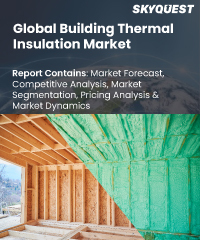
Report ID: SQMIG15F2118

Report ID:
SQMIG15F2118 |
Region:
Global |
Published Date: November, 2024
Pages:
157
|
Tables:
90 |
Figures:
76
Building Thermal Insulation Market size was valued at USD 32.81 Billion in 2023 and is poised to grow from USD 34.29 Billion in 2024 to USD 48.76 Billion by 2032, growing at a CAGR of 4.5% during the forecast period (2025-2032).
Thermal insulation plays a crucial role in reducing energy consumption in the construction industry by effectively blocking the transfer of heat through building enclosures.
Building insulation products, with their thermal conductivity of less than 0.2 W/mK, provide an excellent solution for preventing heat loss or gain within enclosed spaces. They not only help conserve energy but also offer additional structural support, particularly in roofing applications.
Governments recognize the benefits of efficient building thermal insulation and have introduced regulations mandating minimum insulation levels. For instance, the Residential Tenancies Act in New Zealand, implemented since July 2019, requires all rental houses to have ceiling and underfloor insulation installed according to specific guidelines.
Due to the increasing focus on energy conservation in both residential and commercial sectors, the demand for thermal insulation is expected to rise. This growth will be driven by heightened concerns regarding energy efficiency, as well as the implementation of strict government regulations aimed at reducing energy usage and greenhouse gas emissions.
US Building Thermal Insulation Market is poised to grow at a sustainable CAGR for the next forecast year.
Our industry expert will work with you to provide you with customized data in a short amount of time.
REQUEST FREE CUSTOMIZATIONWant to customize this report? This report can be personalized according to your needs. Our analysts and industry experts will work directly with you to understand your requirements and provide you with customized data in a short amount of time. We offer $1000 worth of FREE customization at the time of purchase.

Report ID: SQMIG15F2118